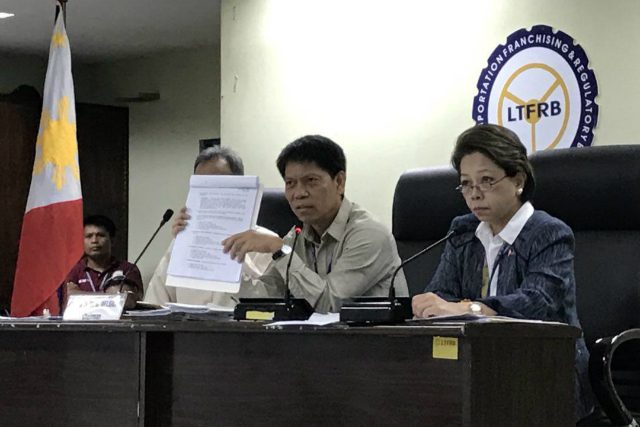SUMMARY
This is AI generated summarization, which may have errors. For context, always refer to the full article.

MANILA, Philippines – The Land Transportation Franchising and Regulatory Board (LTFRB) officials on Tuesday, May 29, said they “were not informed” that ride-hailing company Grab would be charging passengers minimum fares.
Visibly surprised by the information, LTFRB Chairman Martin Delgra III asked Grab representatives during a hearing when the minimum fares were imposed.
Grab lawyer Miguel Aguila said they started on June 5, 2017.
“Ayusin ’nyo nga ’yung papel ’nyo. Ang gulo,” Delgra told Grab. (Fix your papers. It’s a mess.)
PBA Representative Jericho Nograles informed the LTFRB in a hearing on Tuesday that Grab Philippines charges “illegal” minimum fares, which “were not declared” by the ride-hailing company,
Nograles said Grab charges a minimum of P80 for its sedan and 6-seater vehicles, while the premium cars start at P125.
In response to a question, Delgra said during a media interview that the board was not informed of charges separate from the flagdown rate of P40.
“Obviously, [we were] not [informed] insofar as the computation of minimum fare is concerned – compared to the base fare and in relation to the other factors to determine the fare,” Delgra said.
Delgra said the LTFRB is not yet considering suspending Grab’s minimum fares, but the board needs a clarification on the matter.
“We won’t necessarily remove this, but we are asking for clarification. We are only following the 4 elements in determining fares,” he said in Filipino.
Delgra said that the fares depend on the computation of the flagdown rate, the distance traveled, time charges, and the surge pricing.
Under the government-approved fares, Grab charges an additional P10 to P14 per kilometer and has a surge cap of twice the distance traveled on top of the flagdown fare.
Grab said that it was never the company’s intention to “hide” the fare from its patrons.
“What you see on the app, that is an upfront fare. If it is a minimum distance, it’s a minimum fare, we never tried to hide it from the general public,” Grab spokesperson Leo Gonzales said.
Illegal charges?
Nograles earlier accused Grab of illegally charging its customers P2 per minute of travel on top of its government-approved pricing scheme. The charge has since been suspended. (READ: Did Grab ‘illegally’ charge its riders higher fare?)
The lawmaker’s allegation prompted an LTFRB hearing to determine the validity of the travel charges.
“If they truly subject themselves to the board, then why didn’t they apply to the board? Their only formal application for it was January of this year, way after they unilaterally imposed it,” Nograles said.
The lawmaker said Grab’s move puts into question the authority of LTFRB as a regulatory agency.
LTFRB earlier said they were not consulted either when the P2-per-minute fare was initially charged.
The ride-hailing company’ legal counsel argued that the P2-per-minute charge was added to cover the costs of the drivers when picking up the passenger at their pinned location in the Grab app.
During the hearing, Delgra asked Grab to submit to the board the company’s earnings since the P2-per-minute charge was imposed.
For the drivers
Winson Esteras, leader of the coalition of transport network vehicle services, said on Tuesday that the P2-per-minute charge helps drivers cope with the costs incurred by longer travel time due to traffic congestion.
“Kung mapapansin ‘nyo naman na hindi na talaga kami kumikita…. Pa’no ‘yung traffic? ‘Yung fare ngayon hindi na aligned sa sinisingil na gas sa amin,” Esteras said.
(If you notice, we’re not earning a lot…. How about the traffic? The fare now is not aligned with the cost of gas.)
Grab Philippines had admitted that its riders were not informed when the additional charges were rolled out starting June 5, 2017.
They argued that this is legal and asked for it to be reimposed, saying that it is for the drivers’ benefit.
Grab still dominates the Philippine ride-hailing market after the exit of Uber last April.
The LTFRB recently approved 5 new companies that would challenge Grab, but most have yet to be operational in Metro Manila. (READ: How much are the fares of new ride-hailing apps?) – Rappler.com
Add a comment
How does this make you feel?
There are no comments yet. Add your comment to start the conversation.